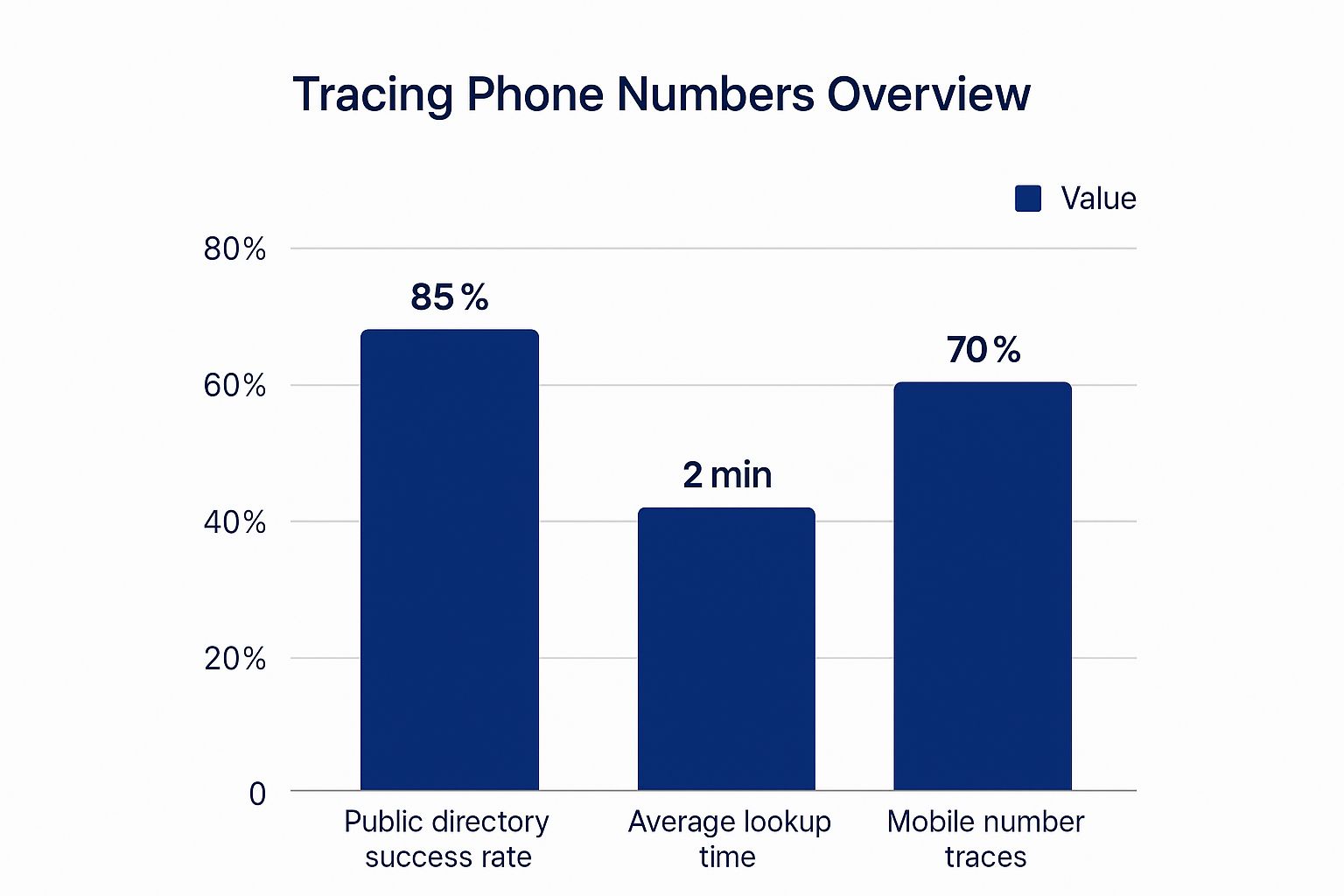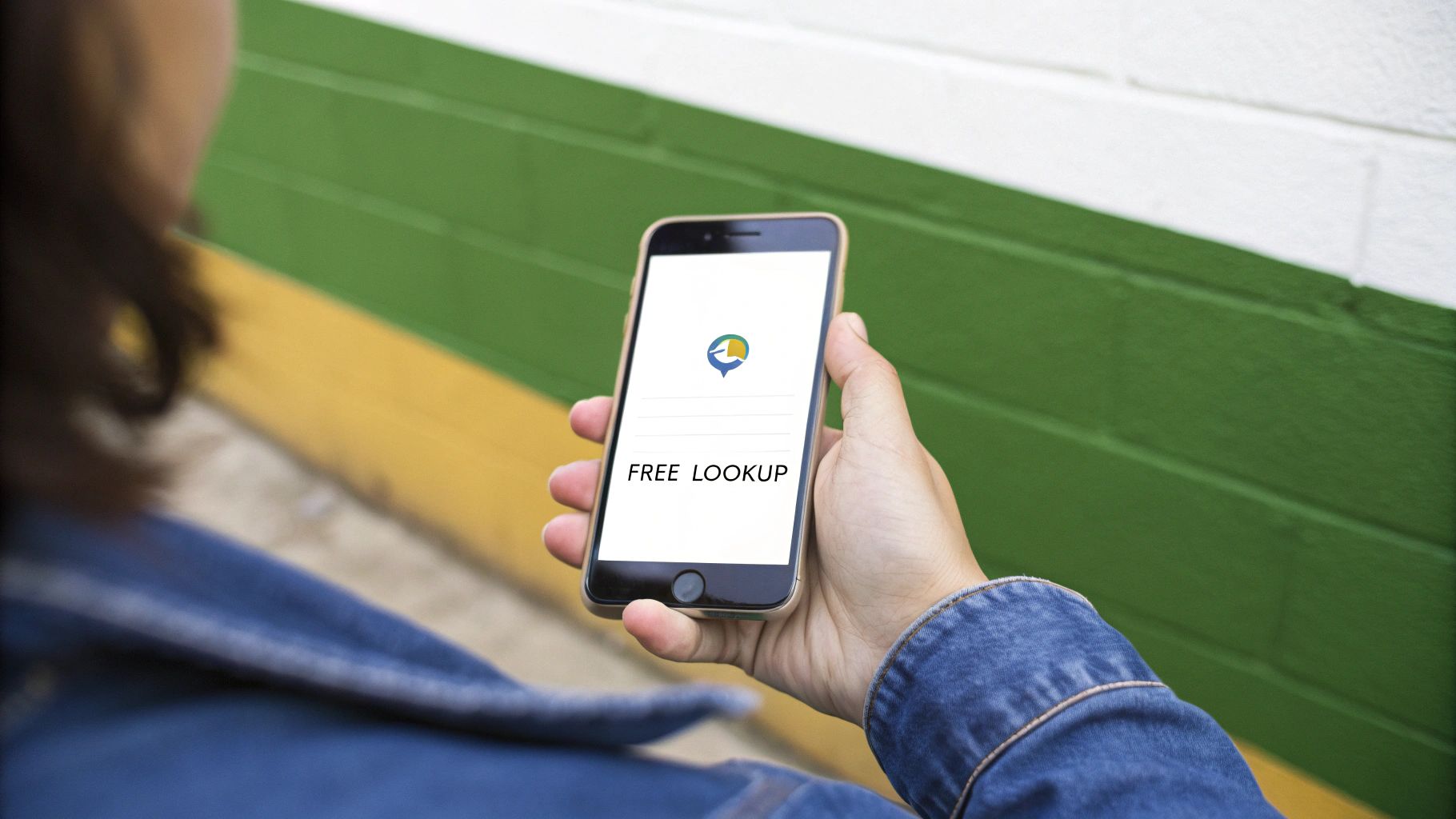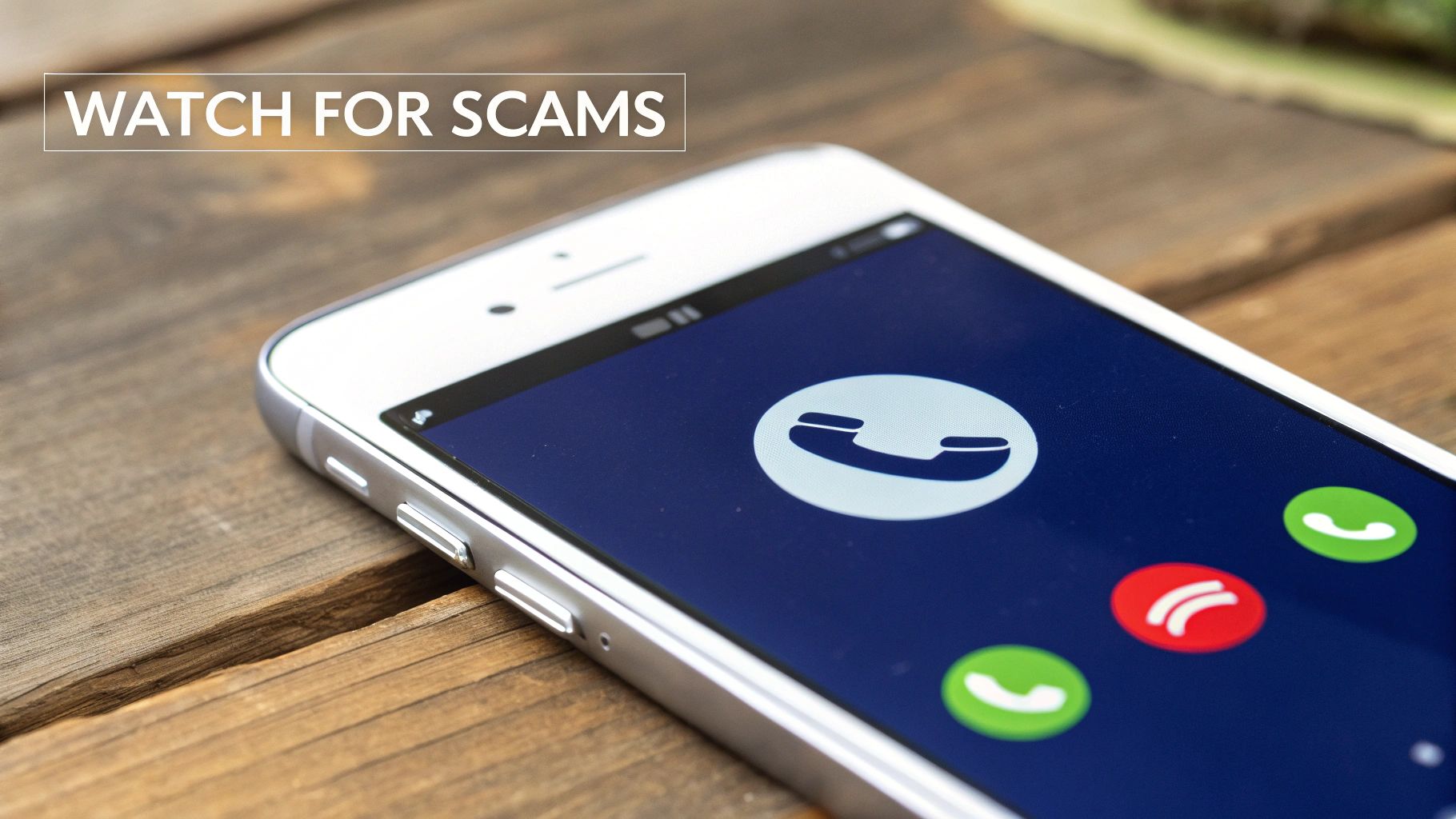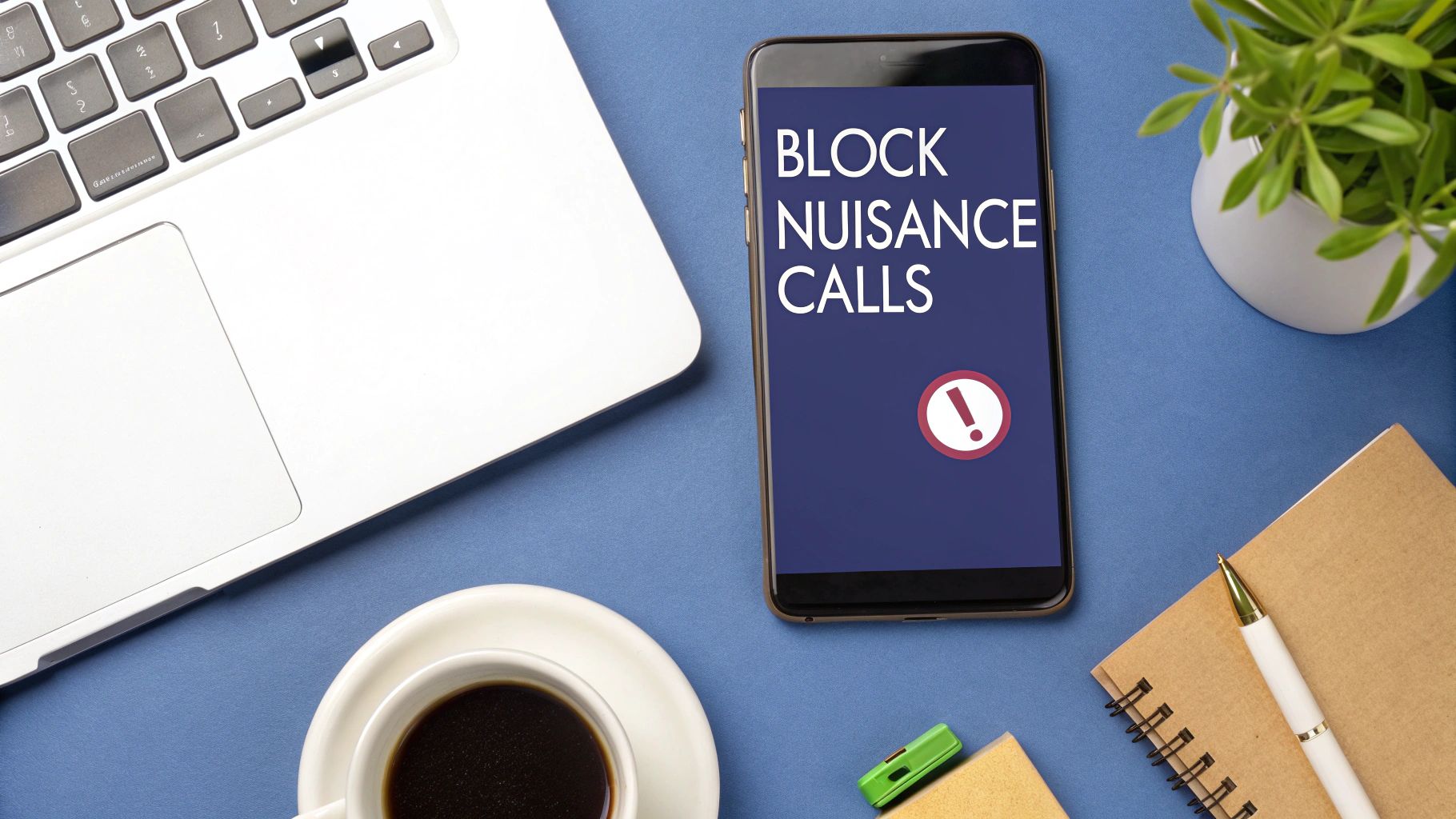Tracing Telephone Numbers in UK A Practical Guide
- Showix technical Team
- Jul 22, 2025
- 13 min read
Updated: Jul 26, 2025
Trying to trace a telephone number in the UK isn't just a matter of plugging it into a search engine and hoping for the best, especially when you're dealing with a mobile number. The reality is that you need to be a bit of a detective, and that starts with understanding the clues hidden in the number itself. Success often hinges on knowing whether the number is public or private and using legal methods that respect the UK's strict privacy laws, like GDPR.
Decoding UK Phone Numbers Before You Start
Before you jump into tracing any UK telephone number, take a moment to look at what you’ve actually got. Not all numbers are created equal, and figuring out the type of number you're dealing with will set realistic expectations for your search.
The UK's numbering plan, which is managed by Ofcom, neatly organises numbers into different categories. This structure is your first big advantage, helping you narrow down the possibilities right from the get-go.
Know Your Number Types
The first few digits of a UK phone number—the prefix—are your most valuable piece of information. It tells you whether you're trying to find a fixed landline, a personal mobile, or something else entirely.
Landlines (01 and 02 prefixes): These are geographic numbers, meaning they're tied to a specific location. For instance, 0121 is for Birmingham, and 020 is for London. Tracing a business landline is usually quite straightforward as they are often listed in public directories.
Mobiles (07 prefixes): This is the prefix you’ll see most often, and frankly, it's the hardest to trace. Mobile numbers are personal and are fiercely protected by privacy regulations.
Freephone (0800 and 0808 prefixes): Businesses and charities typically use these numbers. As the name suggests, they're free to call. Since they're designed for public contact, they are often easy to identify.
Premium-Rate (09 prefixes): Be wary of these. They are expensive to call and are used for things like competitions, voting lines, or adult entertainment. They have to be registered, but finding the ultimate owner can still be tricky.
Understanding these differences is key. Your chances of identifying an 01 or 02 number through basic searches are far higher than for an 07 mobile number.
To give you an idea of the scale of the challenge with mobiles:
There are roughly 88.4 million active mobile connections in the UK. That’s more than the entire population—about 127% coverage! This means many people have multiple SIM cards or devices, which seriously complicates any attempt at a direct trace. You can learn more about the complexities of tracing UK phone numbers from specialists in the field.
To simplify this, the table below gives a quick overview of what the prefixes mean.
Quick Guide to UK Telephone Number Prefixes
This table is a handy reference for identifying the type of service a UK number is linked to, just by looking at its prefix.
Prefix | Type of Number | Common Use Case |
|---|---|---|
01 | Geographic Landline | Homes and local businesses (e.g., Manchester, Bristol) |
02 | Geographic Landline | Homes and businesses in major cities (e.g., London, Cardiff) |
03 | UK-Wide | Non-geographic numbers charged at the same rate as landlines |
07 | Mobile | Personal mobile phones, pagers, and personal numbering |
0800 / 0808 | Freephone | Customer service lines, charities, and helplines |
084 / 087 | Business Rate | Service numbers used by businesses (e.g., technical support) |
09 | Premium Rate | Competitions, adult services, and high-cost information lines |
Having this knowledge helps you decide your next steps and what tools might actually work.
This chart provides a quick visual breakdown of what to expect when you're tracing different kinds of numbers.

As you can see, while public directories are a great resource, tracing mobile numbers is a significant challenge. This is precisely why knowing the number type from the very beginning helps you choose the right tools and strategies for the job.
Simple Checks You Can Do Yourself
Before you even think about paying for a service, there are a few straightforward and completely legal checks you can run from your own computer. You might be surprised by what you find. Tracing a phone number in the UK doesn't always have to be a high-tech affair, especially if the number belongs to a business or has been posted publicly online.
These first steps won't cost you a penny, just a few minutes of your time.
Master the Search Engine
Your best friend here is a search engine, but most people don't use it to its full potential. Just dumping the number into Google will likely throw up a mountain of useless results. The key is to be precise.
Try putting the full phone number inside quotation marks, like this: “0161 123 4567”. This little trick tells the search engine to look for that exact string of numbers. It’s amazing how often this simple search will pull up a business listing in a local directory, a contact page on a company website, or even a forum post where someone has shared their details.
If that draws a blank, get a bit more creative. Try searching the number without its area code (e.g., “123 4567”) along with the name of the town or city you think it might be connected to. This can help you find a match where the number has been written down more informally.
A tip from my own experience: A lot of small business owners, tradespeople, and people selling things online will put their mobile numbers on sites like Gumtree, Facebook Marketplace, or local community pages. Using quotation marks is your best chance of finding these exact matches.
Use Social Media and Messaging Apps
Social media and messaging apps can be a treasure trove of public information. Many of us have our phone numbers linked to our profiles and don't realise our privacy settings make them visible to others.
Here's where to start:
Facebook: Pop the phone number directly into the search bar. If the person has their number linked and their privacy settings permit it, their profile could pop right up.
LinkedIn: This is especially useful for work-related numbers. Searching for a number can often lead you straight to a professional's profile.
WhatsApp, Signal, or Telegram: This is a classic move. Save the number to your phone’s contacts – just call it something like "Number Query" for now. Then, open WhatsApp or another messaging app and check your contacts. If a profile is attached to that number, you'll often see a name and, just as importantly, a profile picture.
Don't give up if you only find a profile picture. Screenshot it and run it through a reverse image search tool like Google Images or TinEye. People tend to reuse the same profile picture everywhere, so a quick search could lead you to their named profiles on Facebook, Instagram, or X (formerly Twitter).
These basic checks are the bedrock of any good DIY phone number trace.
Getting Help from Online Phone Tracing Services
So, you’ve hit a dead end trying to trace the number yourself. The next logical step for many is to look online for a specialist tracing service. But be warned: the internet is a minefield of options, and knowing who to trust when you’re trying to trace a UK telephone number is absolutely critical.
You’ll see countless "free" reverse lookup websites that promise the world. Honestly, for UK mobile numbers, they’re almost always a waste of time. Thanks to strict privacy laws like the GDPR, these free sites just can't get their hands on the kind of accurate, current data needed to link an 07 number to a specific person. The most you'll likely get is the mobile network provider, which isn't much help.
Telling the Good from the Bad
This is where reputable, paid-for services come in. They aren't doing anything shady; they are legitimate data specialists who subscribe to compliant databases and operate entirely within UK law. It's a completely different world from the free-for-all sites. For a deeper dive into the professional methods we use, you can read our guide on tracing a UK phone number.
The real trick is managing your expectations and learning to spot the red flags of a dodgy operator.
If a website promises instant, guaranteed results for any mobile number, your alarm bells should be ringing. It’s almost certainly a scam designed to take your fee and give you nothing of value in return. Real, lawful tracing requires careful cross-referencing and takes time.
Here's a quick look at what a professional, trustworthy tracing service's website looks like. Notice their focus on clear, fair terms.

That ‘No Trace, No Fee’ promise you see in the screenshot? That’s the gold standard. It’s a clear sign of a confident and transparent provider, giving you peace of mind that you only pay if they actually find the information.
How Do the Legitimate Services Work?
So, where do the good guys get their information? The best UK tracing companies use sophisticated, real-time verification systems to ensure their data is both accurate and legally compliant. The leading services maintain vast, lawfully sourced databases that are updated constantly.
To give you an idea of scale, some top-tier services manage databases with over 180 million UK landline and mobile records, all cross-referenced with other verified details like addresses. They typically work on a ‘no trace, no fee’ basis, which minimises your risk. A successful trace usually costs in the ballpark of £150.
This professional approach guarantees that any information you receive has been obtained legally and is reliable enough to act on. When you're picking a service, always look for these clear signs of a legitimate operation:
GDPR Compliance: They should openly state their commitment to UK data protection laws.
'No Trace, No Fee' Policy: This is your best safeguard. If they can't find it, you don't pay.
Transparent Pricing: You should know exactly what you're paying with no hidden charges or dodgy subscriptions.
Realistic Timelines: A proper trace takes a few days, not a few seconds.
By taking the time to vet the service you choose, you can confidently move forward without getting ripped off or inadvertently breaking the law.
Knowing When to Call in the Professionals
While running a few online checks yourself can be tempting, those DIY methods have a pretty low ceiling. They might work for simple, low-stakes situations, but when things get serious, you need to know when to hand the baton over to an expert.
If you're dealing with persistent harassment, trying to track down a debtor who's vanished, or searching for a missing person, you've moved beyond the scope of a simple online search. These scenarios aren't just about finding a name; they require a delicate and legally sound investigation.
The Professional Edge
This is where a real private investigator makes all the difference. We bring a combination of experience, skill, and access to resources that the general public simply can't get their hands on. Tracing a phone number correctly in the UK is a craft, blending old-school investigative work with a solid understanding of today's privacy laws.
A good investigator has access to professional, compliant databases that are worlds away from the patchy, often outdated information you'll find on public websites. But the real skill isn't just getting the data—it's knowing how to interpret it, cross-reference it, and verify it in a way that will stand up to scrutiny.
This is especially true for mobile numbers, which are notoriously difficult to trace through public means. An investigator connects the dots in a way no automated tool can, ensuring the details you receive are both accurate and, crucially, obtained lawfully. That last part is vital—if information is sourced illegally, it's completely useless for any official purpose, like in court.
For any serious matter, the real value of a professional isn't just getting an answer. It's the peace of mind that comes from knowing the entire process was handled ethically and legally, protecting you from any potential trouble down the line.
How to Choose the Right Investigator
Once you’ve decided you need professional help, picking the right agency is the most important step. You're looking for a firm that is not just good at what they do, but one that works transparently and strictly within UK privacy regulations.
Here are the non-negotiables you should look for:
ICO Registration: Any legitimate agency handling personal data in the UK must be registered with the Information Commissioner's Office (ICO). No exceptions. This proves they're accountable and serious about data protection.
'No Trace, No Fee' Guarantee: This is a huge sign of a confident, results-driven agency. It means you only part with your money if they successfully find the information you asked for. It's your best protection against paying for nothing.
Clear Communication: A true professional will be upfront from the very beginning. They should clearly explain their process, the costs involved, and what you can realistically expect as an outcome.
Vetting an agency on these points ensures you're partnering with a credible expert. For a deeper dive into this, our guide on how to trace someone in the UK the right way has even more practical tips. When the stakes are high, hiring a professional isn't just another option—it’s the smartest and safest move you can make.
Staying Within Legal and Ethical Lines

When you decide to trace a phone number in the UK, you’re not just solving a puzzle. You’re navigating a minefield of privacy laws. It’s absolutely crucial to understand where the legal lines are drawn to make sure your efforts are both effective and, most importantly, lawful.
The big players here are the Data Protection Act 2018 and the UK General Data Protection Regulation (GDPR). These aren’t just suggestions; they’re strict rules designed to protect personal information. And yes, a phone number is very much considered personal information. Any attempt you make to trace one must have a legitimate reason and be carried out using legal methods.
Understanding Legitimate Interest
So, what actually counts as a "legitimate reason"? This is the key question, and the answer isn't "I was just curious." Legitimate interest usually comes into play when you need to trace the number to protect your own legal rights or assets.
Here are a few real-world scenarios where you’d likely have a solid justification:
Debt Recovery: You need to find a debtor who has gone silent and isn't responding.
Serving Legal Documents: You have to locate someone to formally serve them with court papers.
Investigating Harassment: You're trying to identify the source of persistent malicious or threatening calls.
In situations like these, you have a defensible cause. The core idea is that your need for the information outweighs the individual's right to privacy. Simply wanting to find out who’s behind a missed call doesn’t cut it.
The principle is straightforward: if you have a genuine legal or official purpose for the information, your trace is far more likely to be considered legitimate. On the flip side, any information gathered illegally is useless in court and could land you in serious legal trouble.
What Crosses the Line
The most significant mistake you can make is to step over that line into illegal territory. A classic example of this is pretexting.
Pretexting is essentially lying to get information. It involves pretending to be someone you’re not—maybe a bank employee, a council official, or even a friend of the person you’re tracing—to trick a company or another individual into handing over private data. This isn't just unethical; it’s a criminal offence.
Knowing what’s legal and what isn't is paramount. While pretexting is out, using publicly available knowledge for deduction is perfectly fine. For example, understanding the history of UK phone numbers can be a powerful and lawful tool. Ofcom has managed number allocations since 1994, and knowing how regional prefixes have evolved can help verify a number's likely origin without ever touching private data.
This historical context allows for smart, lawful deduction, which is a world away from deception. For a deeper dive into the laws that govern this kind of work, our guide to private investigation law in the UK provides a comprehensive breakdown.
Ultimately, respecting data protection laws is not optional. Proceeding responsibly means you can get the answers you need without creating a whole new set of problems for yourself.
Got Questions About Tracing UK Phone Numbers? We’ve Got Answers

Even when you know the steps, diving into the world of phone number tracing can feel a bit murky. It’s only natural to wonder about the legal side of things, how much it might cost, and what your chances of success actually are.
Let's clear up some of the most common queries I hear. My goal is to give you the confidence to get the information you need, the right way.
Is It Actually Legal for Me to Trace a Phone Number in the UK?
Yes, absolutely—as long as you have a legitimate reason and use lawful methods. This is the most important distinction to understand.
A legitimate reason isn't just curiosity. We're talking about things like needing to recover an unpaid debt, formally serve legal documents, or gather evidence to stop someone from harassing you. In these cases, you’re acting to protect your legal rights or financial interests.
The "how" is just as crucial. Using illegal tactics like pretexting (pretending to be someone else to trick a company into giving up data), hacking, or accessing private records without consent is a serious offence. This would put you in breach of UK laws like the Data Protection Act and GDPR. Always, always stick to reputable services or licensed investigators who play by the rules.
Can I Realistically Trace a Mobile Number for Free?
Honestly, it's highly unlikely. The web is full of sites offering free reverse phone lookups, but when it comes to private UK mobile numbers, they almost never deliver accurate or current information.
This isn't always because they're outright scams. The simple truth is that UK privacy laws are tight, which prevents these sites from legally accessing the data needed to identify a person. At best, a free search might reveal the mobile network the number belongs to (like Vodafone or O2), but that doesn't tell you who owns the phone.
To get a reliable name and address for a mobile number, you almost always need to tap into specialised, commercial-grade databases. This is the domain of paid-for, legally compliant tracing services or professional private investigators. Be extremely wary of any free tool promising guaranteed results for a mobile number—it’s usually too good to be true.
What Information Can a Professional Tracer Actually Uncover?
A professional tracing agent can give you the essentials: the name and current address linked to the phone number you have. They can also usually confirm if the number is still active on a network. They do this by legally and ethically cross-referencing the number against multiple compliant and up-to-date data sources—information the public can't access.
It’s just as important to know what they cannot find for you. This includes:
A log of calls made or received.
The content of text messages.
Real-time GPS tracking of the phone's location.
Trying to get this kind of information is illegal and a massive invasion of privacy. No professional, ethical investigator would ever offer it.
How Much Does It Cost to Trace a Telephone Number?
The cost really depends on how tricky the trace is and which service you go for.
A good online tracing agency that works on a 'no trace, no fee' basis is a great starting point for straightforward cases. You can expect to pay somewhere between £100 and £200 for a successful result. This gets you the name and address you need without a huge outlay.
If you’re dealing with someone who is actively trying to avoid being found, or the situation is more complex, hiring a private investigator is your best bet. While it costs more—perhaps a few hundred pounds—you’re paying for a deeper, more thorough service that guarantees the information is verified and obtained lawfully. Always get a clear quote upfront and make sure they offer a 'no trace, no fee' policy. It’s your best protection.
If your situation calls for a discreet, professional, and legally compliant investigation, Sentry Private Investigators Ltd can help. Our experienced team uses ethical methods to get you the accurate information you need. For a confidential consultation, visit us at https://www.sentryprivateinvestigators.co.uk.





Comments